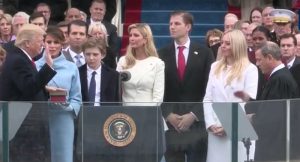Blind Trusts – What are they and how do they work?
 Over the last few weeks there has been a lot of information in the media about blind trusts. Some of this commentary has been correct, and some has not. That’s why we thought it would be helpful to put together this article to explain what blind trusts are, and how they work.
Over the last few weeks there has been a lot of information in the media about blind trusts. Some of this commentary has been correct, and some has not. That’s why we thought it would be helpful to put together this article to explain what blind trusts are, and how they work.
The Problem.
Let’s take an imaginary politician who we will call Mrs Z. Mrs Z has an investment portfolio which includes investments in many different companies. One of those companies is the imaginary Czech Computer company, ABC a.s.
Mrs Z also happens to be the Minister of Education.
The Ministry has decided to order 10,000 new computers for Czech schools, and also decides to buy those computers from ABC a.s.. This is a big order, and it makes the share price of ABC go up. As a result, Mrs Z makes some money.
Even if Mrs Z wasn’t directly involved in the decision to buy the computers, the whole thing ‘smells bad’ because there is a conflict of interest. It is even worse if she was the person who made the decision. Of course, she will claim that she made the decision because it was the right decision and in the best interests of the ministry and the schools. But the problem is that the decision, even if the right one, benefits her personally.
If we look at the reason it ‘smells’ more closely:
- Mrs Z knows that she owns the ABC shares. She knows that if she gives ABC the contract, she will benefit personally
- Even worse, Mrs Z has ‘inside information’. She knows about the contract before it is announced to the public. She has control of her investment and so she could buy more ABC shares in advance of the public announcement, or sell her shares in DEF a.s. (another computer company) before the announcement
Of course, in most such cases, the politician involved has no such evil intent, but the fact that they know and control all their investments creates a bad perception and leads to questions being asked.
That’s the reason many politicians and others around the world use blind trusts – people like Theresa May, Prime Minister of the UK and former US President Barack Obama. Some Federal jobs in the US even require holders to establish a blind trust.
So, What is a Blind Trust?
A blind trust is a type of trust where the client (Mrs Z) puts her assets into the trust, where they are managed on her behalf. During the life of the trust, Mrs Z has no control and no knowledge of the assets in the trust or how they’re being managed.
An independent manager has full control of the trust assets and does not communicate with Mrs Z about what is being bought and sold within the trust.
Once Mrs Z retires from politics, the trust can end, and all the assets will be returned to her or her family.
How does it work?
Mrs Z sets up a trust.
Normally with a trust, the client has full information and a lot of control over the assets of the trust, but a blind trust is different. Here, the objective is to ensure that Mrs Z’s money is professionally and properly managed, in accordance with her goals and objective, but in such a way that:
-
She does not know what assets are in the trust
-
She has no control over the decision making or management of the trust
Mrs Z’s blind trust gives full control of the trust assets to an independent manager (Usually an investment manager or Private Bank). In addition, another company acts in a supervisory role, stepping into Mrs Z’s shoes to ensure that the money is being invested properly and in accordance with her objectives. The supervisor is also there to check the performance of the manager and has the ability to replace them if they perform poorly. Establishing a blind trust is not a DIY project; it requires experienced professional assistance.
During the establishment phase of the trust, Mrs Z has the ability to provide input such as what the investment objective of the trust will be. For example, should it be invested for growth, income or capital preservation? She also has the ability to provide a range for the asset allocation and to name the beneficiaries of the trust,”
After that, all communication between the Manager and Mrs Z ceases. In fact, there is a strict contractual provision prohibiting any such communication. It is also very important that the Managers are truly independent people (e.g. not golfing buddies) in order to prevent information ‘leakage’. The Manager reports its results and performance to the Supervisor in the normal way, and the Supervisor then in turn provides Mrs Z only with summary information regarding performance etc., but nothing that would in any way allow her to know what assets are being held on her behalf.
Blind trusts create a layer of separation between the client’s assets and political activities that helps to eliminate real or perceived conflicts of interest and accusations of wrongdoing.
Despite claims to the contrary, there is absolutely no reason that a blind trust structure cannot be created under CZ law.
What about Babis (and Trump)?
 In the 21st century, we have opened the door to a new kind of leader – people like Babis and Trump – who are not just politicians but also the owners of large businesses.
In the 21st century, we have opened the door to a new kind of leader – people like Babis and Trump – who are not just politicians but also the owners of large businesses.
There are many arguments about whether or not this is a good thing – we do not comment on this. However, what we can say is it makes the whole concept of conflict of interest more challenging.
In the past, our leaders were people who were not also business owners (May, Obama) or who sold out before taking office (George W Bush). For these people, blind trusts work really well.
However. for Babis and Trump, because of their businesses, they don’t work as well – but they are still better than nothing (or at least they could be if done correctly).
In both cases, they have transferred their businesses to trusts, so technically they are no longer the owners of the business – a (very small) step in the right direction. However, in both cases, the trusts seem to be largely pointless as they are not really blind . .. more like ‘one eye closed, one eye open’ trusts.
Remember, our objective is to prevent conflict of interest in TWO ways;
First KNOWLEDGE: The Founder should not know what assets the trust contains. In the case of Mr Babis and Mr Trump this is, of course, a problem, one that’s impossible to solve even using a trust – because of course Mr Babis still knows that the Trust owns Agrofert. If Agrofert was to be sold it would be all over the media and he’d find out anyway, no matter how robust the trust was.
However, blind trusts can still be useful in relation to the second point (or at least they could be useful if they had been established correctly).
CONTROL: The Founder is not involved in decision making in relation to the assets of the trust. In this way, the Founder can focus on his or her role as a political leader and not be concerned with the running of the business. INDEPENDENT people run the business and make all decisions without informing or seeking input from the founder. This prevents conflict of interest because those making the decisions do not have the unique knowledge of the Founder. The decisions are made from business logic only, without any ‘inside’ knowledge.
However, . . .
Neither Babis nor Trump appear to have established their structures in a way that achieves this goal. That is because those actually running the businesses do not appear to be fully independent of the Founder, and in reality, it is reasonable to assume that the Founder still has a significant input into these decisions.
This lack of independence is the biggest problem and mean that in fact, they don’t have blind trusts at all – or at least not in their current form.
